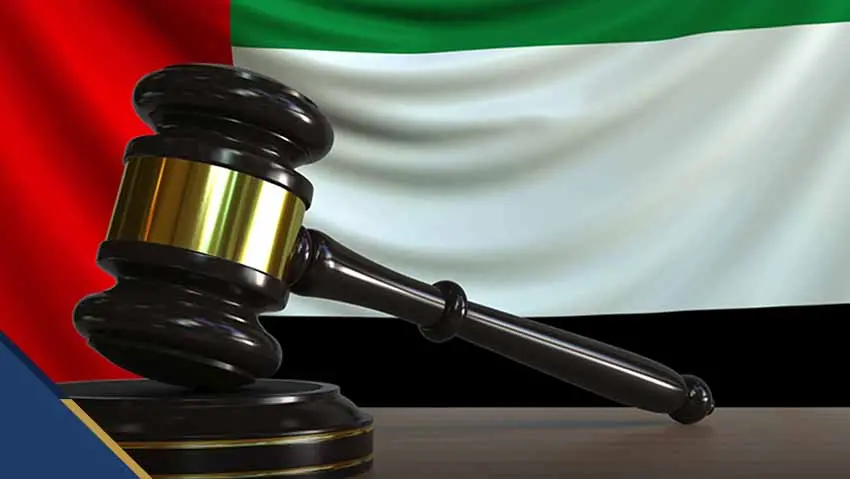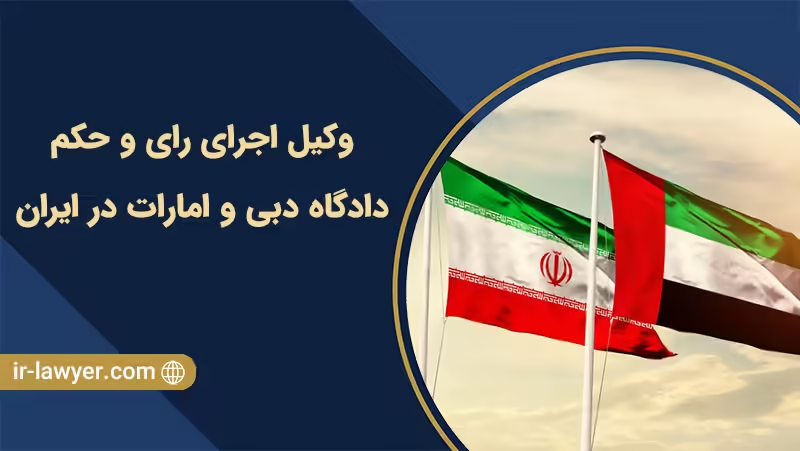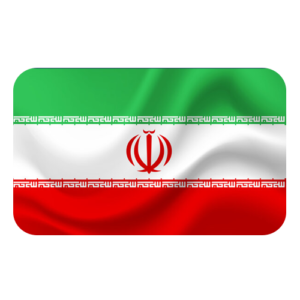خلیل آسای وکیل پایه یک دادگستری 10 سال است که به صورت تخصصی پرونده های اجرای حکم خارجی را در ایران و خارج از ایران انجام میدهد، خلیل آسایش با توجه به انجام پرونده های مختلف در زمینه اجرای حکم دادگاه امارات ( دبی ) در ایران و همچنین اجرای حکم دادگاه ایران در کشور امارات ( دبی)، کاملاً با روند قضایی و پیچدگی های موضوع اجرای حکم دادگاه خارجی آشنا می باشد و می تواند بدون کوچکترین ایراد و اشتباهی در این خصوص به عنوان وکیل یا مشاور حقوقی شما را همراهی نماید.
نکته مهم آنکه جهت شناسایی و اجرای حکم خارجی، استفاده از وکیل متخصص فقط جهت اعلام وکالت از جانب مدعی و خوانده نمی باشد بلکه محکوم علیه حکم کشور امارات که قصد دارد از اجرای حکم دادگاه دبی امارات در کشور ایران ممانعت نماید می تواند با بهره مندی از تجربه وکیل که به قانون داخلی و همچنین قوانین کشور امارات اشراف کامل دارد، می تواند از وارد شدن خسرات سنگین اجرای حکم دادگاه امارات در ایران ممانعت کند .
با توجه به تبلیغات گسترده تعدادی از افراد بدون سابقه در زمینه اجرای حکم خارجی بدیهی است در صورتی که قصد انتخاب وکیل با تخصص در زمینه اجرای حکم دادگاه امارات ( دبی ) در ایران دارید حتماً سوابق کاری وکیل و روزمه وی در زمینه آرا و پرونده های اجرای حکم خارجی بایستی لحاظ گردد تا با انتخاب بهترین شخص نتیجه مناسب از دادگستری کسب نمایید.
در این مقاله، به بررسی ضرورت استفاده از وکیل متخصص برای اجرای حکم دادگاه امارات در ایران میپردازیم. همچنین، شرایط و مدارک لازم برای اجرای رای دادگاه امارات در ایران بهطور دقیق تشریح خواهد شد. هدف از این مقاله، ارائه راهنماییهای کاربردی و ارزشمند برای افرادی است که درگیر این موضوع حقوقی هستند و نیازمند راهنماییهای تخصصی در این زمینه میباشند.
هر گونه کپی برداری از متن پیگیری قانونی دارد.
شرایط اجرای حکم دادگاه خارجی
در مواردی ممکن است با این موضوع و یا سوال مواجه شوید که اجرای حکم دادگاه خارجی به چه نحو است و یا برای اجرای حکم دادگاه خارجی چه باید کرد. امروز با موضوع اجرای حکم دادگاه خارجی در کنار شما عزیزان خواهیم بود و نکات ارزنده ای را به شما تقدیم میداریم. اجرای حکم دادگاه خارجی برای تجار و در مواردی برای اشخاصی که در خارج از ایران اقامت دارند می تواند دارای اهمیت باشد از این رو مقاله تهیه شده در خصوص اجرای حکم دادگاه خارجی را از سوی موسسه حقوقی دادآوران نستوه تقدیم می داریم. شاید در ابتدا این سوالات برای شما تداعی گردد که منظور از اجرای حکم دادگاه های خارجی چیست؟ شرایط اجرای حکم دادگاه خارجی چیست؟ مرجع صالح جهت اجرای حکم دادگاه خارجی کجاست؟ برای تقاضای اجرای حکم دادگاه خارجی چه مدارکی پیوست می شود؟ جهت آشنایی با چگونگی تنفیذ و اجرای حکم دادگاه های خارجی به کدام قوانین مراجعه نماییم؟ بهترین وکیل اجرای حکم دادگاه خارجی در تهران کیست؟ بهترین وکیل ایرانی در دبی و امارات برای اجرای حکم دادگاه خارجی در ایران کیست؟
در مطلب پیش رو به شرح و بررسی چگونگی تنفیذ و اجرای حکم مدنی صادره از دادگاه های خارجی خواهیم پرداخت. قبل از ورود به بحث اصلی باید متذکر شویم؛ احکام مدنی صادره از محاکم ایران پس از قطعیت با رعایت مقررات مربوط به قانون اجرای احکام مدنی قابلیت اجرا دارد، اما آنچه که باید بدان پاسخ داده شود این پرسش است :
آیا احکام مدنی صادره از دادگاه های خارجی قابلیت اجرا در داخل مرزهای ایران را دارد؟ در پاسخ باید به عرض برسد، احکام مدنی صادره از دادگاه های خارجی با رعایت شرایط مقرر در ماده 972 قانون مدنی و مواد 169 به بعد قانون اجرای احکام مدنی قابلیت اجرا در ایران را خواهد داشت.
لازم به ذکر است، تنفیذ و اجرای احکام دادگاه های خارجی مختص به احکام مدنی بوده و احکام کیفری صادره از دادگاه های خارجی قابلیت اجرا در داخل مرزهای کشورمان را ندارد
شرایط اجرای احکام مدنی صادره از دادگاه های خارجی کدام است؟
ماده 169 قانون اجرای احکام مدنی شرایط مربوط به اجرای احکام مدنی صادره از دادگاه های خارجی را تعیین نموده است، این شرایط عبارتند از:
- حکم از محاکم کشوری صادر شده باشد که به موجب قوانین خود یا عهود یا قراردادها احکام صادره از دادگاه های ایران در آن کشور قابل اجراء باشد یا در مورد اجرای احکام معامله متقابل نماید. بنابراین لازم است، حکم خارجی از دادگاهی صادر شده باشد که احکام صادره از محاکم ایران را در داخل آن کشور قابل اجرا باشد.
- مفاد حکم بر خلاف قوانین آمره، نظم عمومی یا اخلاق حسنه نباشد. بنابراین احکام خارجی که مفاد و محتوای آن به نوعی بر خلاف قوانین امری یا امور شرعی و عرفی جامعه ایران باشد قابلیت تنفیذ و اجرا در داخل کشور را نخواهد داشت.
برای مثال، حکم صادره در خصوص ازدواج دو همجنس، هرگز از طریق محاکم ایران قابلیت تنفیذ و اجرا نخواهد داشت زیرا مفاد و محتوای چنین حکمی با قانون و شرع مغایرت دارد. - اجرای حکم خارجی بر خلاف عهدنامه های بین المللی که به امضای دولت ایران رسیده یا مخالف قوانین مخصوص نباشد.
برای مثال، حکم مطالبات مربوط به خرید و فروش مواد مخدر در ایران قابل اجرا نبوده و نیست چرا که مطابق عهدنامه های بین المللی خرید و فروش اقلام مخدر ممنوع و غیر قانونی می باشد. - حکم خارجی قطعی و لازم الاجراء باشد و به علت قانونی از اعتبار نیفتاده باشد. در واقع حکم دادگاه خارجی باید به مرحله قطعیت و اجراء رسیده باشد و از طریق اعتراض در مراحل بعدی رسیدگی از اعتبار نیفتاده باشد.
- از دادگاه های ایران حکمی مخالف دادگاه خارجی صادر نشده باشد. بنابراین اگر سابقاً در موضوع اختلاف دادگاه ایرانی رسیدگی و حکم صادر نموده باشد دیگر نوبت به اجرای حکم دادگاه خارجی نخواهد رسید.
- رسیدگی به موضوع دعوی مطابق قوانین ایران اختصاص به دادگاه های ایران نداشته باشد. بنابراین، در صورتی که رسدگی به دعوی در صلاحیت محلی و ذاتی محاکم ایران باشد حکم صادره از دادگاه خارجی در ایران به اجراء در نخواهد آمد.
- حکم راجع به اموال غیر منقول واقع در ایران و حقوق متعلق به آن نباشد. چنانچه موضوع دعوی از اموال غیر منقول باشد، مطابق مقررات قانون آیین دادرسی مدنی رسیدگی به اختلاف در صلاحیت دادگاه محل وقوع مال غیر منقول بوده و دادگاه خارجی صلاحیت رسیدگی به موضوع را ندارد.
- دستور اجرای حکم از مقامات صلاحیت دار کشور صادر کننده حکم صادر شده باشد. منظور این است، در خصوص حکم خارجی دستور اجرا داده شده و اجراییه صادر شده باشد.
مرجع صالح جهت اجرای حکم مدنی دادگاه خارجی کجاست؟
بر اساس ماده 170 قانون اجرای احکام مدنی مرجع صالح دادگاه محل اقامت محکوم علیه است. در صورتی که محل سکونت یا اقامت محکوم علیه در ایران معلوم نباشد دادگاه تهران صالح به رسیدگی می باشد.
به تقاضای اجرای حکم صادره از دادگاه خارجی چه مدارکی پیوست می شود؟
مطابق ماده 173 قانون اجرای احکام مدنی به تقاضانامه اجرای حکم باید مدارک زیر پیوست گردد:
- رونوشت حکم دادگاه خارجی که مطابقت آن با اصل به وسیله مامور سیاسی یا کنسولی کشور صادر کننده حکم گواهی شده باشد به همراه ترجمه رسمی به زبان فارسی.
- رونوشت اجراییه با گواهی نماینده سیاسی یا کنسولی ایران در کشوری که حکم از آنجا صادر شده یا نماینده سیاسی یا کنسولی کشور صادر کننده حکم در ایران با ترجمه رسمی به زبان فارسی.
- گواهی امضاء نماینده سیاسی یا کنسولی کشور خارجی مقیم ایران از طرف وزارت امور خارجه.

حکم دادگاه امارات در ایران با رعایت قوانین داخلی ایران و شرایط امارات
شرایط اجرای حکم دادگاه امارات و دبی در ایران چیست ؟
زمانی حکم دادگاه امارات در ایران اجرا میگردد که علاوه بر رعایت شرایط از طرف دادگاه کشور صادر کننده حکم (امارات)، قوانین داخلی ایران نیز رعایت شده باشد. لذا وکیل با تخصص اجرای حکم دادگاه امارات در ایران نه تنها نسبت به قوانین داخلی ایران بایستی مطلع باشد، بلکه جهت اجرای حکم دادگاه امارات بایستی به قوانین شکلی و ماهوی امارات ( دبی ) نیز بایستی احاطه کامل داشته باشد. لذا به موجب موارد ذیل کلیاتی از شرایط مورد نیز جهت اجرای حکم اشاره میگردد:
- در صورتی كه حكم دادگاه امارات با قوانین مربوط به نظم عمومی و اخلاق حسنه ایران مغایرت نداشته باشد حکم اجرا میگردد. به فرض مثال حکم درخصوص ارز دیجیتال از دادگاه امارات دبی دارای محدودیت های خاص خویش است.
- حكم و رای کشور امارات با مقررات و عهد نامه های بین المللی كه ایران عضو آن است مغایر نباشد چرا که در مواردی ممکن است قراردادی با یکی از کشور های خلیج فارس منعقد شده باشد ولی حکم صادر از دبی مخالف عهد نامه مزبور باشد
- حكم دادگاه کشور نبایستی باطل شده یا از اعتبار امر مختوم برخوردار نباشد.
- حكم صادر دادگاه امارات دبی با رای صادر شده از دادگاه های ایران نبایستی مغایرت داشته باشد. که البته از لحاظ تاریخ ثبت دادخواست و مقدم و موخر بودن حکم خارجی و داخلی این موضع بسیار مهم است.
- رسیدگی به موضوع دعوی که از طرف دادگاه امارات بررسی شده مطابق قوانین ایران اختصاص به دادگاه های ایران نداشته باشد، لذا موضوع صلاحیت در خصوص اجرای حکم امارات در ایران بسیار با اهمیت می باشد.
- حكم دادگاه امارتی راجع به اموال غیرمنقول واقع در ایران و حقوق متعلق به آن نباشد که البته این مهم خط قرمز تمام کشور ها جهت اجرای حکم خارجی می باشد.
مدارک مورد نیاز اجرای حکم دادگاه امارات ( دبی) در ایران چیست؟
یکی از سوالات رایجی که در این موضوع مطرح میشود این است که مدارک و شرایط اجرای حکم دادگاه امارات چیست؟ مدارک مورد نیاز برای اجرای حکم دادگاه امارات در ایران دو دسته است مورد اول مدارک عمومی که در قانون ذکر شده و کلیاتی از آن به شرح ذیل مطرح میگردد و بخش دوم مدارک خاصی است که به صورت گواهی بایستی از دادگاه امارات اخذ شود تا وکیل با تخصص اجرای حکم خارجی، امکان اجرای حکم دادگاه امارات در ایران را داشته باشد. لذا پیشنهاد میگردد قبل از آنکه مدارک خود را در امارات جمع آوری نمایید در همان ابتدای کار با وکیل اجرای حکم خارجی ( امارات) مشورت نمایید.لذا فارغ از متن گواهی خاص از دادگاه امارات، کلیات مدارک عمومی مورد نیاز بیان میگردد:
- تصویر مصدق حکم دادگاه صادر شده از دادگاه امارات
- ترجمه رسمی گواهی شده رای دادگاه امارات به زبان فارسی
- تصویر مصدق گواهی نماینده سیاسی یا كنسولی ایران در كشور امارات
- ترجمه رسمی گواهی شده دستور فوق به زبان فارسی
- تصویر مصدق گواهی امضای نماینده کشور امارات در ایران
لذا موارد مزبور مدارک عمومی مورد نیاز جهت اجرای حکم دادگاه امارات در ایران می باشد لذا در صورتی که تصمیم دارید از مدارک خاص ضروری نیز مطلع شوید می توانید با خلیل آسایش وکیل ایرانی در دبی و امارات و تهران تماس بگیرید.

مدارک عمومی و خاص اجرای حکم دادگاه امارات در ایران
چگونه حکم کشور امارت (دبی) را در ایران اجرا کنیم؟
یکی از قانون های حاکم جهت اجرای حکم دادگاه امارات در ایران، قانون اجرای احکام مدنی می باشد که مقرر نموده جهت اجرای حکم در ایران بایستی ابتدا حکم دادگاه امارات یا دبی باید در ایران تنفیذ و شناسایی شود تا قابلیت اجرا پیدا کند، از طرفی ماده 169 این قانون پیش بینی شده کرده، احکامای مدنی صادره از دادگاههای کشور امارت (دبی) در صورتی در ایران قابل اجرا میداند که واجد شرایط تعیینشده باشد:
- اولین شرط قانونی اجرای رای دادگاه امارات دبی در ایران این است که حکم باید از کشوری صادر شده باشد که به موجب قوانین خود یا عهود یا قراردادها، احکام صادر از دادگاههای ایران در آن کشور قابل اجرا باشد یا در واقع، در صورتی حکم دادگاه کشور امارت (دبی) در ایران اجرا میشود که حکم دادگاه ایرانی نیز در آن کشور اجرا گردد، این قانون بین دو کشور وجود دارد ولی کشور امارات در اجرای حکم کشور ایران بسیار سختگیر است و در موارد بسیاری اجرای حکم را ریجکت می نماید
- دومین شرط مهم جهت اجرای حکم و رای دادگاه امارات ( دبی) در ایران رعایت نظم عمومی یا اخلاق حسنه می باشد. در واقع، اگر حکم در امارات صادر گردد که به نحوی مخالف اخلاق حسنه یا نظم عمومی تلقی شود، هرگز مجال اجرا در داخل ایران را نخواهد یافت. به عنوان مثال حکمی از دادگاه امارات در ر زمینه ارز دیجیتال یا خسارت ناشی از قمار یا کالای قاجاق صادر گردد در ایران نمی توان آن را اجرا کرد از طرقی، اجرای حکم دادگاه امارات در ایران نباید مخالف با عهود بینالمللی که دولت ایران آن را امضا کرده یا مخالف قوانین خاص باشد.
- شرط مهم بعد جهت اجرای حکم دادگاه امارات در ایران قطعی و لازمالاجرا بودن حکم اماراتی می باشد البته نکته مهم این بند اجرای حکم غیابی و حضوری می باشد که این دو تفاوتی بسیار مهمی بایگدیگر دارند که در مقاله دیگری در این خصوص صحبت شده است.
برای دریافت اطلاعات درباره قانون همکاری قضایی بین کشور ایران و امارات، کلیک کنید.
- شرط مهم دیگر که حکم صادره از دادگاه کشور امارت (دبی) باید داشته باشند تا بتوان آنها را در ایران اجرا کرد، بدین ترتیب است که دادگاه ایران حکمی مخالف دادگاه کشور امارت (دبی) صادر کرده باشد و رسیدگی به موضوع دعوی مطابق قوانین ایران اختصاص به دادگاههای ایران نداشته باشد؛ لذا اگر موضوعی در صلاحیت دادگاه ایران باشد، هرگز دادگاه کشور امارت (دبی) نمیتواند در خصوص آن حکم صادر کند و اگر حکمی هم صادر کند، قابلیت اجرا نخواهد داشت. البته این بعد نیز دارای تخصیص های خاص خودش می باشد و در خصوص حکم متعارض و مخالف زمان صدور حکم متعارض در کشور ایران بسیار با اهمیت است.
- شرط دیگر در خصوص اجرای حکم دادگاه امارات در ایران چنین است که حکم دادگاه امارات راجع به اموال غیر منقول و ملک و زمین واقع در ایران و حقوق متعلق به آن نباشد، این شرط خط قرمز تمامی کشور ها جهت اجرای حکم خارجی می باشد زیرا رسیدگی به این موضوعات تنها در صلاحیت دادگاه محل وقوع مال غیرمنقول است و دادگاه کشور امارت (دبی) هرگز صلاحیت رسیدگی به این موضوعات را ندارد.

وکیل متخصص برای اجرای حکم دادگاه امارات در ایران
آیا برای اجرای حکم و رای دادگاه امارات در ایران نیاز به وکیل متخصص است؟
بسیاری بر این باورند که با صدور حکم دادگاه امارات علیه یک محکومعلیه ایرانی، ادامه مسیر برای اجرای حکم دادگاه امارات در ایران آسان است و دادگاه ایرانی در هر حال حکم دادگاه امارات، خواه حضوری یا غیابی، را اجرا مینماید. بنابراین، میتوان این کار را شخصاً یا توسط هر وکیلی انجام داد. اما، اجرای حکم دادگاه امارات در ایران، از حساسیت و پیچیدگی بسیار بالایی برخوردار است. بهطوریکه اهمیت اخذ حکم در ایران برای اجرای حکم دادگاه امارات، کمتر از اخذ حکم ماهوی قطعی در خارج از ایران نیست.
به همین دلیل، تعداد بسیار کمی از وکلا در این خصوص تجربه دارند و از نقاط ضعف و قوت قانونی مطلع هستند. بهره بردن از یک وکیل متخصص در اجرای حکم دادگاه امارات در ایران میتواند نقش بسزایی در صرفهجویی هزینه و جلوگیری از هدررفت تلاشهای فراوان در اخذ حکم خارجی ایفا کند. متأسفانه، برخی افراد با کپیبرداری از این سایت و ادعای کذب تخصص در اجرای حکم دادگاه امارات، خسارات جبرانناپذیری وارد کردهاند. لذا توصیه میشود که قبل از محول کردن پرونده خود، حتماً رزومه عملی و مکتوب وکیل مورد نظر را بررسی نمایید.
جمع بندی
اجرای رای دادگاه ایران در دادگاه امارات نیاز به تخصص و تجربه کاری بالا دارد و یقیناً وکیلی از توان انجام اینکار برخوردار می باشد که که علاوه بر جواز، عملاً و به طور مستقیم در دادگاه امارات به عنوان وکیل فعالیت نموده و از مدارک و شرایط لازم و قوانین حاکم بر دعوای اجرای حکم خارجی در دادگاه امارات اطلاعات کامل داشته باشد.
شایان ذکر است تشریفات دادرسی، هزینه و قوانین کشور امارات جهت اجرای حکم خارجی در مقایسه با فرایند اجرای حکم خارجی در کشور ایران بسیار متفاوت می باشد و با وجود توافق و معاضدت قضایی، اجرای حکم دادگاه ایران در کشور مزبور با سختگیری و حساسیت بالایی انجام میگردد؛ لذا اگر این اقدام حقوقی بدون تجربه عملی و با نادیده گرفتن تشریفات دادرسی و قانون حاکم انجام شود؛ ضمن تباه شدن هزینه دادرسی، احتمال مختومه شدن پرونده نیز وجود دارد.
بنده سالهاست که با مطالعه قوانین شکلی و ماهوی کشور امارات در زمینه اجرای حکم دادگاه خارجی، به صورت تخصصی در حال انجام کار وکالت در کشور امارات می باشم و با یک رزومه و سابقه کاملا مشخص تاکنون احکام زیادی از دادگاه ایران با موضوعات مختلف را در دادگاه دبی اجرا نموده ام لذا تجربه کاری و تخصص بنده در موضوع اجرای حکم دادگاه ایران در امارات می تواند به شما هموطن عزیز در اخذ نتیجه مثبت و اخذ حکم اجرا کمک فراوانی نماید.
متاسفانه بعضی از اشخاص با کپی برداری از سایت بنده و ادعای کذب اجرای حکم خارجی و انجام کار در کشور امارات، در پی سو استفاده از هم وطنان می باشند که یقیناً این اقدام می تواند خسارت جبران ناپذیری به شما وارد نماید، لذا به شما اعلام می نمایم که پروانه وکالت ایران هیچ کاربردی در دادگاه های کشور امارات ندارد و یقیناً اجرای احکام حقوقی ایران در آن کشور نیاز به جواز و شرایط قانونی می باشد، لذا سابقه عملی وکیل ایرانی در دبی خود را به درستی بررسی نمایید.
خلیل آسایش
سوالات متداول
- آیا برای اجرای رای دادگاه امارات در ایران نیاز به وکیل متخصص است؟
این سوال بسیار متداول است زیرا بسیاری از مردم میخواهند بدانند آیا میتوانند بدون کمک وکیل متخصص، روند اجرای حکم را پیگیری کنند یا خیر.
- چه مدارکی برای اجرای رای دادگاه امارات در ایران نیاز است؟
این سوال اغلب مطرح میشود زیرا دانستن دقیق اسناد و مدارک مورد نیاز برای اجرای حکم، میتواند در تسریع و تسهیل فرایند اجرای حکم کمک کننده باشد.
- آیا حکم دادگاه امارات در مورد اموال غیرمنقول در ایران قابل اجرا است؟
این سوال بسیار رایج است زیرا بسیاری از مردم میخواهند بدانند آیا احکام صادره در امارات مربوط به اموال غیرمنقول در ایران قابل اجرا هستند یا خیر، که این موضوع به طور مستقیم به صلاحیت دادگاههای محل وقوع مال بستگی دارد.




